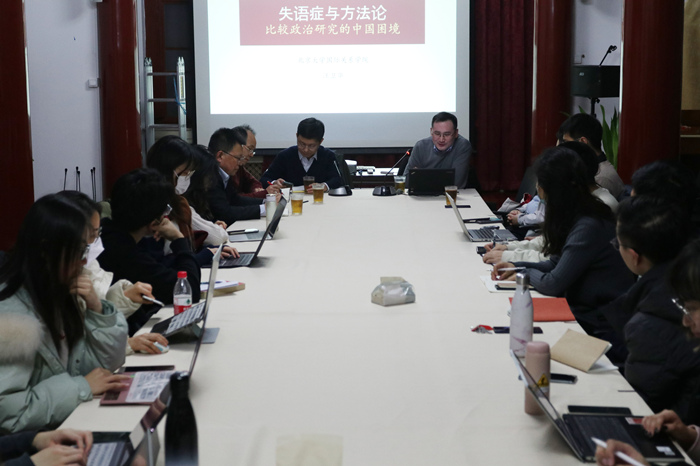On the evening of March 18, 2022, the Institute of International and Strategic Studies (IISS), Peking University (PKU) held the 56th lecture of “North Pavilion Seminar” series. Mr. Wang Weihua, Associate Professor of the School of International Studies (SIS), PKU and Director of Comparative Politics Department at SIS, PKU, delivered a lecture entitled “Aphasia and Methodology — China’s Dilemma in Comparative Politics". This lecture was hosted by Gui Yongtao, Vice President of IISS, PKU and Vice President of SIS, PKU.

Mr. Wang first pointed out that comparative politics studies in China currently still could not shake off its “exotic” characteristics of the discipline itself: Domestic scholars have not integrated the traditional political practices within the theories. Though training in domestic political methodology has been apparently reinforced, the academic articles on political theory are even harder to comprehend.
Then Mr. Wang compared the research tradition of comparative politics established in the 20th century with the new research trend gradually formed in the 21st century. The former points to reform and new policies, focusing on practical aspects such as foreign affairs and political reform; while the latter regards comparative politics as science, emphasizing theoretical answers and explanations to political phenomena. However, the science element in politics is overemphasized. Articles on comparative politics in Chinese academia are seemingly more and more like “writing English articles with Chinese characters”, and no real theoretical progress can be observed in them.
Mr. Wang described the specific signs of “aphasia” in comparative politics studies with vivid examples: “People write articles with foreign tones and European style wording; they adopt concepts mindlessly and confuse one thing with another; they are eager to bluff but like reading without thorough understanding; they boast science but do things like a fortune-teller.” He opined that methodology education could not solve the problem of aphasia for the following reasons: “People fail to learn foreign languages well and already forget how to use Chinese; they are enthusiastic about ontology but forget epistemology; they emphasize operationalization but ignore conceptualization; they overstate universality but fail in contextualization; they try to keep up with the foreign ‘eight-legged essay’ but become doctrinaire.”
Finally, Mr. Wang concluded that the key to shaping theoretical thinking for Chinese people was not methodology training, but semantic field and epistemology. Nowadays, comparative politics studies should pursue “contextualization cognition” rather than “coverage cognition”. Scholars studying international relations should get rid of the limit of formalism and establish Chinese discourse in political science after they have thoroughly studied Western theories.
During the Q&A session, Mr. Wang had deep discussions with the faculty and students present at the lecture on a series of topics, including the value position of Chinese scholars citing exotic concepts, the origin of China’s comparative politics studies, and the history of the development of politics as a discipline in China. (Contributed by: Wang Xiayue)
Editor: Li Fangqi Photographer: Zheng Peijie

